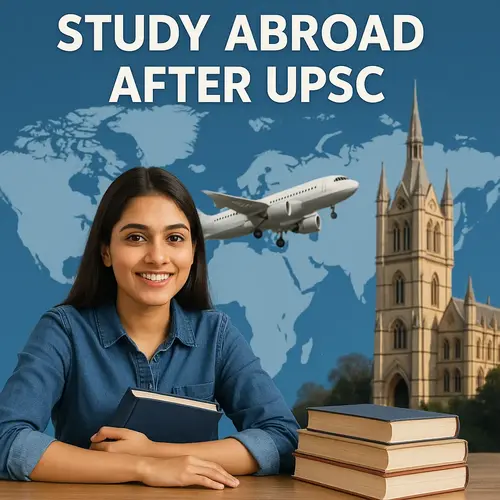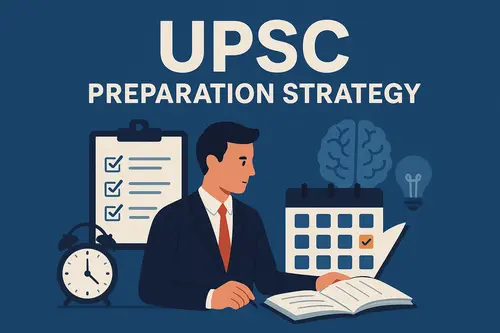
The modern social environment has transformed in such a way that online content appears authentic and factual as you browse through LinkedIn or Instagram where many people share their “IT” lifestyle which does not always reflect reality. The vague fact about polished profiles showing IAS officers attending Harvard or LSE or Oxford has created an aspiration among students to pursue UPSC so they can study abroad after clearing UPSC. But is it the whole truth? Or a half cooked Clickbait? Every UPSC aspirant wonders about the opportunity to study abroad after UPSC completion. Some individuals achieve this dream but it proves more complicated than its outward appearance.
The blog post will analyze the study leave policies affecting All India Services officers who are IAS, IPS, and IFS. This article will explain the requirements for study leave eligibility and examine the conditions for receiving leave salary and foreign study benefits and permitted course types and bond requirements.
This article will use the official Study Leave Regulations of 1960 to explain the actual terms of these opportunities while evaluating which candidates qualify and determining their actual accessibility versus internet-based misconceptions.
Study Leave Regulations, 1960
Central government in consultation with state government understood the need of educating employees in different services to gain more knowledge regarding their work for enhanced efficiency, which eventually led to passing of THE ALL INDIA SERVICES (STUDY LEAVE) REGULATIONS, 1960. These regulations are still relevant today to guide different officers and government seeking study leave during their tenure.
Who Is Eligible? Reality Check
Many people believe that everyone who clears UPSC automatically gets a chance to study abroad or in India—but that’s simply not true. The Study Leave Regulations, 1960, governs and restricts study leave eligibility for only selected IAS, IFS, and IPS officers.
For other central government employees a different regulations regulate the study leaves which is CENTRAL CIVIL SERVICES (LEAVE) RULES, 1972 and each state government has different rules for their employees and officers. For Example- Uttar Pradesh has STUDY LEAVE RULES made by the Governor under rule 84 of the Uttar Pradesh Fundamental Rules.
Conditions for Study Leave
Under the 1960 Study Leave Regulations, civil servants can study abroad only when the government finds it clearly aligned with public interest. Here’s a quick look at the core requirements:
1. For professional or specialized advancement
Advanced education scholars who pursue technical training need to study subjects which match their current job liabilities.
2. For training or study tenures
Training and study stint programs qualify for evaluation when they stay connected to job duties although they do not have formal academic delegation. But Study leave authorization requires sanctioned blessing from the designated authority responsible for granting similar leave. also, a detailed report is required on return.
3. To understand governance more
Civil retainers need to study public administration fabrics and backgrounds in order to qualify for taking up similar studies. Again, Study leave authorization requires sanctioned blessing from the designated authority responsible for granting similar leave and a detailed report regarding the visit is required.
4. For overall intellectual development
Civil retainers can admit blessing from the Central Government and through individual case assessments for courses that are not related to their duties but expand their perspectives to deliver better service. Important Conditions( Especially for Points 2 & 3 Above) You must submit a detailed report about your educational conditioning combined with work experience during your leave period after you complete your return from leave.
For Study Leave Out of India, Central Government’s approval is mandatory and Leave will not be granted for the execution of studies in subjects for which acceptable installations
is present in India or under any of the Schemes administered by the
Government of India.
5. Minimal Service demand
Officers come eligible for study leave after completing 7 years of service. Whereas those from North- Eastern configurations like Assam- Meghalaya or Nagaland — need only 6 years.
6. Retirement and Cadre Criteria
The officer shouldn’t retire within 3 year of return from study leave. However, they must get blessing from the parent state, If posted outside their state.
Maximum Duration of Study Leave
The Government of India allows IAS, IPS, and IFS officers to take study leave, but within strict time limits. Officers can usually take up to 12 months of study leave at one time. Any extension beyond this one-year mark is extremely rare and granted only in exceptional cases with strong justification.
The Government of India allows IAS, IPS, and IFS officers to take study leave, but within strict time limits. Officers can generally take up to 12 months of study leave at one time. Any extension beyond this one- time mark is extremely rare and granted only in exceptional cases with strong defense. Over the course of their entire service, officers can mileage a outside of 24 months( 2 times) of study leave in total. This limit also includes any former study leave taken under other service rules.
Officers may combine study leave with earned or casual leave, but their total absence from duty must n’t exceed 28 months — or 36 months in the case of Ph.D. programs.
In special cases, the Government may allow an officer named for a prestigious fellowship — similar as Chevening, Fulbright, or Inlaks — to exceed the 2- year study leave limit. still, this is subject to concurrence by the Central Government and fulfillment of all eligibility and service- related conditions.
If the study program ends before the approved leave period, you must report back to duty immediately. Unless you get prior government approval to treat the remaining time as ordinary leave.
Study Allowance and Leave Salary
Leave Salary– During study leave, the officer receives the same salary as drawn while on duty, along with Dearness Allowance, House Rent Allowance, and a Study Allowance—subject to adjustments based on any scholarship, stipend, or part-time employment income.
Study Allowance for Foreign Study Leave- While pursuing a honored course of study at an institution While bearing an approved study stint or examination During the time spent on final examinations related to your course .
Note: Study allowance is limited to a outside of 24 months in aggregate.
Per Day Study Allowance Rates (as per country):
| Country | Per Day Rate (Pound Sterling) |
|---|---|
| United States of America | £2.75 |
| United Kingdom | £2.00 |
| Continent of Europe | £1.65 |
| New Zealand | £1.20 |
| Australia | £1.00 |
- For any other country, the allowance rate will be specially decided by the Central Government.
How and When Study Allowance is Paid?-
- You can admit study allowance monthly, but only provisionally.
- You must give a written undertaking promising to refund any redundant quantum if You fail to submit needed attendance instruments, or You fail to meet any other eligibility conditions.
Study Allowance During recesses
You may get study allowance during holidays too, but under certain conditions :-
- Allowed if You are attending a special course or training as directed by the Government, indeed during the break, or You submit evidence( to the Government or Head of Mission) that you are continuing your studies during the holiday
- These holidays are counted within the 24- month study allowance cap.
- No Study Allowance For Any holiday after the course ends — only 14 days outside is allowed.
- Any particular break or interruption during the study, taken for your own convenience.
Exception – Sick Leave If you fall sick and can not study,The Government( or the Head of Mission abroad) can authorize study allowance up to 14 days at a time. This is allowed only in genuine cases of illness that intrude your studies.
Leave salary as was paid while on duty + Dearness Allowance +Human Resource Allowance +Study Allowance which is subject to Scholarship, Stipend, & Part-Time employment.
Who pays the tuition fees? Government or the officer?
Officers generally bear their own tuition fees. In special cases, the Government may cover full or partial tuition fees if the officer receives no external financial aid, or if the scholarship or stipend is less than the actual course fees.
Refund Rules & Exemptions: What Happens If You Don’t Complete Your Study Leave?
Refund Is Mandatory– If You Fail/Leave the Course and quit service before completing bond period. And in that case, they must Refund Full leave Salary, Study Allowance and any other government-paid expenses.
Exemptions– Officers must generally serve a bond period after returning. However, the Government may waive the refund of study leave salary and allowances under specific conditions, such as retirement on medical grounds or permanent absorption in a public institution.
The Central Government may waive or reduce the refund amount either in public interest or under exceptional personal or professional circumstances. Furthermore, in special exit cases after such a waiver, the study leave period is adjusted against earned leave available at the time the leave began.
Application Process: A Tough Road
The detailed step-by-step application procedure is included in Appendix B of the Study Leave Regulations. It includes:
- Cadre clearance
- Course approval
- Bond signing
- Documentation of relevance and duration
The Myths busted
- “You can go abroad right after clearing UPSC” – No, Serving as government employee for 7 years is mandatory and some relaxation for few cadres.
- “Govt. sends everyone to study abroad” – No, only the ones who fulfills the required criteria.
- “UPSC prep helps you get Ivy League admits”- No, colleges can vary.
- “Government Sponsors the whole course”– In selective cases, Govt sponsors some amount of tuition fees but it is the responsibility of the officer.
- “Government provides Travel imbursements“- There are criteria’s for getting travel allowance but it cannot be reimbursed fully for everyone.
- “Can do numerous Courses of different time periods“- Specific time periods as well as courses subjects are mentioned in this blog post.
Conclusion
In conclusion, studying abroad after UPSC isn’t a myth—it’s a carefully structured opportunity that only a select few officers have successfully pursued. For example, officers like Shah Faesal (Harvard Kennedy School), Armstrong Pame (University of Birmingham), and Kannan Gopinathan have leveraged study leave to gain global exposure. As a result, they brought fresh perspectives and innovative ideas back to Indian public service. While the path is competitive and regulated, it is certainly achievable with the right planning, purpose, and approvals.
“Dream smart, not just big—understand the system before you plan your global goals.“
FAQ’s
Yes, but only IAS, IPS, and IFS officers under the Study Leave Regulations, 1960 are eligible — and even then, strict conditions apply.
Normally 7 years of service, though for North-Eastern cadres like Assam-Meghalaya and Nagaland, it is 6 years.
Officers usually pay their own tuition. In some cases, the government may cover partial or full fees if external scholarships are insufficient.
Officers can take up to 12 months at a time, with a lifetime maximum of 24 months (2 years). For Ph.D. programs, it can extend to 36 months.
No — it’s a myth. Only officers meeting eligibility, service requirements, and government approval can avail the opportunity.

very informative